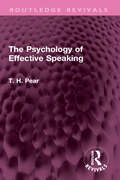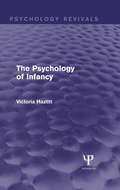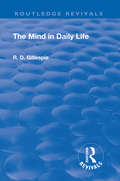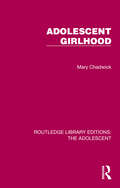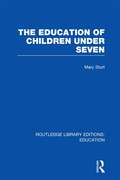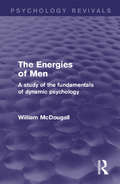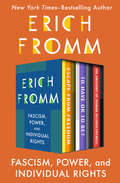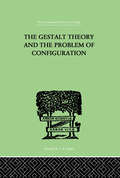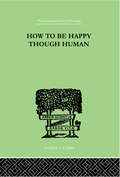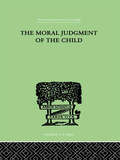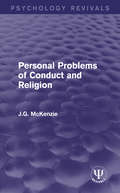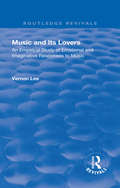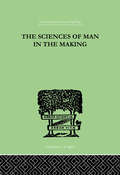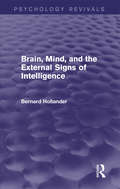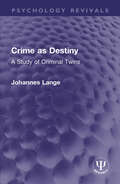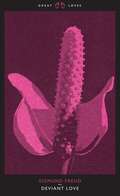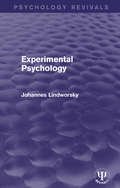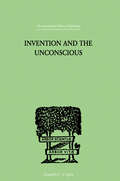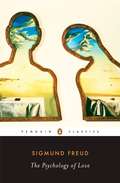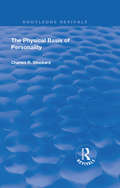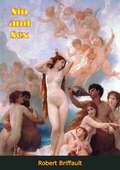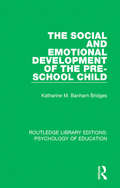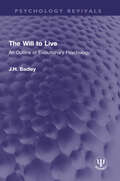- Table View
- List View
Experience and its Modes
by Michael OakeshottWhen it first appeared in 1933, Experience and its Modes was not considered a classic. But as philosophical fashion moved away from the analytic philosophy of the 1930s, this work began to seem ahead of its time. Arguing that experience is 'modal', in the sense that we always have a theoretical or practical perspective on the world, Michael Oakeshott explores the nature of philosophical experience and its relationship to three of the most important 'modes' of non-philosophical experience - science, history and practice - seeking to establish the autonomy and superiority of philosophy. In recognition of its enduring importance, this book is presented in a fresh series livery for a new generation of readers, featuring a specially commissioned preface written by Paul Franco.
The Psychology of Effective Speaking (Routledge Revivals)
by T. H. PearFirst published in 1933, The Psychology of Effective Speaking studies voice as an expression of personality. This book also criticises the education of its time, but not always destructively. It asks why, since people speak, they should not speak better. It suggests that if democracy is to succeed, rapid increase in the effectiveness of vocal communication is urgently necessary, and that this improvement begin in the lower classes of the schools. This book will be of interest to students of rhetoric, communication and psychology.
The Psychology of Infancy (Psychology Revivals)
by Victoria HazlittOriginally published in 1933, this volume was the result of many years’ careful first-hand study of child psychology enriched by the author’s unusually wide experience in dealing with the subject with students. It was intended to follow the development of children from infancy to adolescence, but was cut short due to the author’s untimely death. The book makes available the results of modern experimental work of the time, much of which was published in scattered journals. Chapters deal with the development of sensory and muscular control, including walking and talking, and with the development of the intellectual, emotional and social life of children up to three years of age. A pioneer in the development of experimental psychology Hazlitt’s work can now be enjoyed again in its historical context.
Revival: The Mind In Daily Life (1933) (Routledge Revivals)
by R. D. GillespieThis book is an elementary exposition. It contains no more technically than seemed readily understandable by the intelligent layman and the medical student desiring a merely general introduction to modern views on the motives of human conduct and the mental processes of which that conduct is the expression. Part I gives some account of processes and motives that are universal and therefore normal. Part II is written from the angle of the physician who sees the results, always common but nowadays more frequently discussed, of the miscarriage of the normal development of human beings as such.
Vintage Sacks
by Oliver SacksVintage Readers are a perfect introduction to some of the great modern writers presented in attractive, accessible paperback editions."It is Dr. Sacks's gift that he has found a way to enlarge our experience and understanding of what the human is." --The Wall Street JournalDubbed "the poet laureate of medicine" by The New York Times, Oliver Sacks is a practicing neurologist and a mesmerizing storyteller. His empathetic accounts of his patients's lives--and wrily observed narratives of his own--convey both the extreme borderlands of human experience and the miracles of ordinary seeing, speaking, hearing, thinking, and feeling. Vintage Sacks includes the introduction and case study "Rose R." from Awakenings (the book that inspired the Oscar-nominated movie), as well as "A Deaf World" from Seeing Voices; "The Visions of Hildegard" from Migraine; excerpts from "Island Hopping" and "Pingelap" from The Island of the Colorblind; "A Surgeon's Life" from An Anthropologist on Mars; and two chapters from Sacks's acclaimed memoir Uncle Tungsten.From the Trade Paperback edition.
Adolescent Girlhood (Routledge Library Editions: The Adolescent)
by Mary ChadwickOriginally published in 1932, Adolescent Girlhood set out to give a general view of the more everyday problems a girl might encounter during adolescence. Both at home and at school and those problems that had, despite their prevalence, not gained as much attention or understanding as they merited or required. It was assumed that readers interested in development would have had some knowledge of the general concepts of psychology and psychoanalysis, given the prominence of discoveries in these fields over the previous ten to twenty years. <p><p> It starts with some history of the adolescent girl, including their representation in literature and goes on to cover issues such as physical changes, as well as psychological and emotional expectations. Today it can be read and enjoyed in its historical context. <p><p> This book is a reissue first published in 1932. The language used is a reflection of its era and no offence is meant by the Publishers to any reader by this re-publication.
The Education of Children Under Seven (Routledge Library Editions: Education)
by Mary SturtThis book does not cover the whole field of Infants’ Teaching but is concerned mainly with general principles and matters which are open to the non-specialist. Some technical subjects such as Physical Education have been omitted but nonetheless the volume provides a thorough (if somewhat dated) introduction to early years education in the first half of the twentieth century.
The Energies of Men: A Study of the Fundamentals of Dynamic Psychology (Psychology Revivals)
by William McDougallFirst published in 1932, the original blurb states: "This is a simplified condensation of the author’s two volumes, An Outline of Psychology and An Outline of Abnormal Psychology, which together give a comprehensive survey of the principles and findings of modern psychology. This is designed as an introduction to the scientific study of man and society for those who have not time or inclination to pursue the more recondite problems of mind. It is suitable for college use in the introductory course. It concentrates on the dynamics of the human organism and aims to give the student that minimum acquaintance with psychology without which he is not fitted to be a citizen of the modern world." Today it can be read and enjoyed in its historical context.
Fascism, Power, and Individual Rights: Escape from Freedom, To Have or To Be?, and The Anatomy of Human Destructiveness
by Erich FrommThree fascinating examinations of the psychology of political power from the New York Times–bestselling author of The Art of Loving. Philosopher and social theorist Erich Fromm is renowned as “a psychologist of penetration and a writer of ability” (Chicago Tribune). In these three riveting works, Fromm sheds light on some of the most critical dilemmas facing humanity. Escape from Freedom: Though freedom has been a prized value in Western culture for centuries, it is often accompanied by feelings of anxiety and powerlessness. Fromm’s compelling study demonstrates how these feelings of alienation can lead to a desire for conformity and authoritarianism, bringing invaluable insight into the rise of Nazism and fascism in Europe. To Have or To Be?: Life in the modern age began when people no longer lived at the mercy of nature and instead took control of it. Fromm argues that through the process of modern materialism, the natural tendency of humankind moved away from practicing human abilities, and instead focused on possessing objects. Humankind therefore began using tools that replace our own powers to think, feel, and act independently. Fromm argues that positive change—both social and economic—will come from being, loving, and sharing. The Anatomy of Human Destructiveness: This classic study makes a distinction between animal aggression and certain forms of destructiveness that can only be found in human beings. His case studies span zoo animals, necrophiliacs, and the psychobiographies of notorious figures such as Hitler and Stalin, offering a comprehensive exploration of the human impulse for violence. This ebook features an illustrated biography of Erich Fromm including rare images and never-before-seen documents from the author’s estate.
The Gestalt Theory And The Problem Of Configuration (International Library Of Psychology Ser.)
by Bruno PetermannThis is Volume VIII of a series of twenty-one on Cognitive Psychology. Originally published in 1932, this study looks at the problem of configuration and the Gestalt Theory, its empirical foundation and dynamics.
How To Be Happy Though Human (Routledge Research International Library of Psychology)
by Wolfe, W BeranFirst published in 1999. Routledge is an imprint of Taylor & Francis, an informa company.
The Moral Judgment Of The Child (International Library Of Psychology Ser.)
by Piaget, JeanFirst Published in 1999. Routledge is an imprint of Taylor & Francis, an informa company.
Personal Problems of Conduct and Religion (Psychology Revivals)
by J.G. McKenzieOriginally published in 1932, Professor McKenzie, author of ‘Souls in the Making’, had been deeply interested for years in helping those afflicted with nervous troubles, moral conflicts, or religious doubts. Each chapter of this book deals with some concrete problem which he had actually faced with one of his patients. He was convinced that many of the severer forms of neuroticism could be prevented if treated with understanding, and that many a parent could have been saved from making a fatal mistake in coping with a ‘difficult’ child, if they had only been taught to deal with such. The practical character of this book can best be judged by a glance at a few of the topics discussed: ‘An Adolescent Problem’, ‘The Problem of Growing Up’, ‘The Troubles of Old Age’, ‘Psychology of Sleeplessness’, ‘The Delinquent Child’, ‘Our Regrets and Our Fears’, ‘Psychology of Faith’.
Revival: Music and Its Lovers (Routledge Revivals)
by Vernon LeeAn empirical study of imaginative responses to music.
The Sciences Of Man In The Making: AN ORIENTATION BOOK (International Library Of Psychology Ser.)
by Edwin A. KirkpatrickThis is Volume XVII of thirty-eight in collection on General Psychology. Originally published in 1932, this is an orientation text on the sciences of man in the making and looks at man as an inhabitant of the earth, how life is preserved, varieties of the human species, avoiding waste and the behaviour of man amongst more.
Brain, Mind, and the External Signs of Intelligence (Psychology Revivals)
by Bernard HollanderBorn in Vienna in 1864, Bernard Hollander was a London-based psychiatrist. He is best known for being one of the main proponents of phrenology. This title originally published in 1931 looks at the different regions of the brain and their various functions in relation to intelligence. From the preface: "The records of cases collected by the author, including some of his own, point to there being at least three main regions of totally different functions…. Of these three regions, the frontal is by far the largest in man and the most important, being the region for the manifestation of the highest intellectual abilities." Back in print this is a chance to read all about the study of the brain, mind and external signs of intelligence from the early twentieth century.
Crime as Destiny: A Study of Criminal Twins (Psychology Revivals)
by Johannes LangeFirst published in 1931, Crime as Destiny throws a beam of light across the darkness which enshrouds the study of the deeper causes of crime and the eternal debate between nature versus nurture. The author’s investigations led him to conclusions of the first importance to the sociologist and the psychologist. But the subject is wilder than it seems and by its direct bearing on the question of determinism will arouse the interest of the theologian and the student of philosophy as well. For the student of history, this research work will help trace the beginning of the logic of eugenics that will eventually take its nightmarish form under Hitler.
Deviant Love (Penguin Great Loves)
by Sigmund FreudSigmund Freud, the founder of modern psychoanalysis, remade our view of the human mind by exploring the unconscious forces that drive us. This collection of his groundbreaking writings on the psychology of love examines the nature of desire, transgression, fantasy and erotic taboo. United by the theme of love, the writings in the Great Loves series span over two thousand years and vastly different worlds. Readers will be transported to different places and introduced to love’s endlessly fascinating possibilities and varied forms: romantic love, platonic love, erotic love, gay love, virginal love, adulterous love, parental love, filial love, nostalgic love, unrequited love, illicit love, not to mention lost love, twisted and obsessional love…
Experimental Psychology (Psychology Revivals)
by Johannes LindworskyOriginally published in German in 1923, this English edition was first published in 1931. From the translators preface: "Experimentelle Psychologie is characterized by an excellent summarizing of the most recent experimental data and by a spirit of fairness which it exhibits in organizing facts under general theoretical principles. Besides informing the reader, it stimulates him by critical remarks and suggestions for further thinking and experimentation." Today it can be read and enjoyed in its historical context.
Invention And The Unconscious (International Library Of Psychology Ser.)
by Joseph-Marie MontmassonThis is Volume X in a series of twenty-one in a collection on Cognitive Psychology. Originally published in 1931, in this book, M. Montmasson is concerned to demonstrate a fact of the first importance, easily overlooked. The fact is this, that human inventions in the widest sense of the word, are products of the unconscious.
The Psychology of Love
by Sigmund FreudFreud?s landmark writings on love and sexuality?including the famous case study of Dora? newly translated and in one volume for the first time This original collection brings together the most important writings on the psychology of love by one of the great thinkers of the twentieth century. Sigmund Freud?s discussions of the ways in which sexuality is always psychosexuality?that there is no sexuality without fantasy? have changed social, cultural, and intellectual attitudes toward erotic life. Among the influential pieces included here are ?On Female Sexuality,? ?The Taboo of Virginity,? ?A Child Is Being Beaten,? and the widely cited case history of the eighteen-year-old Dora, making The Psychology of Love essential reading for anyone who wants to understand Freud?s tremendous legacy. .
Revival: The Physical Basis Of Personality (1931) (Routledge Revivals)
by Charles Rupert StockardAn outcome of the 1930 series of Lane Medical Lectures at Stanford University. To develop the completed personality a long series of interactions between the original basis and the surrounding environment is essential. A discussion of the effects on developing personalities of uniting entire individuals and of transplanting organs and parts leads to a convincing demonstration of the "high improbability of the inheritance of acquired characters." From the chapter on exaggerated deviations from racial types, in which the author treats of dwarfs and giants, we are led into a section on deviations in structural types among various breeds of dogs. The closing chapters treat mainly of the two normal adult types, the dolichocephalic (linear, long-headed) and the brachycephalic (lateral, short-headed), their characteristics, geographic distribution and age modifications. A brief section is devoted to the sex glands, senility and rejuvenation, the author demonstrating that the sex gland rejuvenation idea is based upon an entirely erroneous conception. Man's deviation from his nearest animal relatives, namely, intellectual achievement, has probably been initiated by two evolutionary changes: (1) some mutation which has resulted in the retention of head proportions comparable to those found in the fetal stages of the higher mammals: this gives a disproportionately large cranium and big brain with small facial region as compared to the reverse adult proportions among other mammals; (2) a germinal mutation resulting in an exaggerated prolongation of childhood and the stages of immaturity to more than twenty years, thus extending enormously the learning period of man. There are considerable experimental material, over seventy figures, and a bibliography of 260 titles.
Sin and Sex (Routledge Revivals Ser.)
by Robert BriffaultDelve into the complex interplay of morality, culture, and human sexuality with Robert Briffault's provocative work, "Sin and Sex." This thought-provoking book offers a comprehensive exploration of the ways in which societal norms and religious beliefs shape our understanding and attitudes toward sex and sin.Robert Briffault, a distinguished anthropologist and sociologist, brings his extensive knowledge and analytical skills to bear on this intricate subject. In "Sin and Sex," he examines the historical evolution of sexual mores, the impact of religious doctrines on sexual behavior, and the psychological underpinnings of guilt and desire.The book traces the origins and transformations of sexual morality across different cultures and epochs, revealing how notions of sin and virtue are deeply rooted in social and religious contexts. Briffault explores how ancient civilizations, from the Greeks and Romans to early Christians, viewed sexuality, and how these perspectives have influenced modern Western attitudes.Briffault's analysis is not limited to historical and cultural dimensions; he also delves into the biological and psychological aspects of human sexuality. He discusses the inherent drives and instincts that govern sexual behavior, the development of sexual identity, and the ways in which societal pressures can lead to internal conflicts and neuroses."Sin and Sex" challenges readers to reconsider their preconceptions about morality and sexuality, encouraging a more nuanced and empathetic understanding of human behavior. Briffault's writing is both scholarly and accessible, making complex ideas comprehensible and engaging for a wide audience.This book is essential reading for students of anthropology, sociology, psychology, and anyone interested in the intersections of culture, religion, and sexuality. "Sin and Sex" provides valuable insights into the forces that shape our sexual norms and the ways in which these norms influence our lives.Join Robert Briffault on a journey through the multifaceted world of sin and sex, and discover the profound connections between our deepest desires and the moral codes that seek to regulate them. This seminal work remains a significant contribution to the study of human sexuality and its moral implications.
The Social and Emotional Development of the Pre-School Child (Routledge Library Editions: Psychology of Education)
by Katharine M. Banham BridgesOriginally published in 1931, the study reported in this book was undertaken as part of the research programme of the Canadian National Committee for Mental Hygiene. It represents a systematic inquiry into the social and emotional behaviour of pre-school children as observed from day to day in a nursery school. The study extended over a period of three years, and it concerned children between the ages of two and five years who were in attendance at the McGill University Nursery School and child laboratory. It can now be read and enjoyed in its historical context.
The Will to Live: An Outline of Evolutionary Psychology (Psychology Revivals)
by J.H. BadleyFirst published in 1931, the underlying assumption of The Will to Live is that of a psychological evolution in which mind is regarded not merely as developing in association with nervous and cerebral development, but as being itself the most important factor in the process. It is this assumption which gives meaning to the title that has been chosen for the book. It brings themes like is psychology a science; impulse and growth; the rise of consciousness; the three main lines of instinct; the variability of habit; development of intelligence; thought as judgment and reflection; the critical faculty; simple and complex emotions; ideals and idealization; voluntary activity; sex and conflict; and buried complexes and dreams. This is an interesting historical document for the students of psychology.

